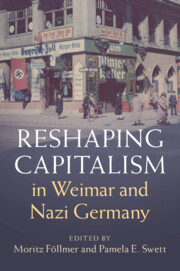‘This pioneering collection sheds new light on how capitalism was lived, critiqued and imagined in this crucial period of German history, bringing social and cultural histories into dialogue with the politics and practices of business life to great effect.’
Neil Gregor - University of Southampton, author of Daimler-Benz in the Third Reich
‘None are so proficient at practicing capitalism yet as fiercely critical of it than the Germans. Reshaping Capitalism approaches the protean nature of commercial activity and the changing attitudes of Germans toward it from wholly new perspectives. This valuable collection forms an indispensable guide to market failure, cultural condemnation of capitalist excess, and the use of racism to legitimate plunder in a Germany poised between democracy and dictatorship.’
Jonathan Zatlin - Boston University
‘Showing the multiple challenges of the interwar economy at work in studies of the individual and corporate actors who had to respond to them, these chapters give life and breath to the familiar diagnosis of a crisis of capitalism and add new terms to the debate about continuity and change in 20th-century Germany.’
Eve Rosenhaft - University of Liverpool
‘Within the recent rise of a 'new history of capitalism', studies of both the Weimar Republic and the Nazi regime have been surprisingly absent. This volume, edited by Moritz Föllmer and Pamela E. Swett, thus clearly fills a gap. Beyond that, it adds relevant findings to the current rediscovery of the interwar years as an epoch comparable to our own times.’
Stefanie Middendorf
Source: German History
‘[An essential reference point for scholarship on capitalism in twentieth-century Germany for years to come.’
Paul Lerner
Source: German Studies Review
‘If you look at the book, which emerged from a workshop at the DHI Washington, as a whole, you can see its special achievement: the creation of a high degree of coherence despite all thematic diversity.’
Jürgen Kocka
Source: Historische Zeitschrift
‘The importance of this collection is the imitable way in which the history of the twentieth century is thought of together with the economic system that has emerged unscathed from every war for centuries, with or without an adapted cultural shell.’
David Hollanders
Source: TSEG - The Low Countries Journal of Social and Economic History



